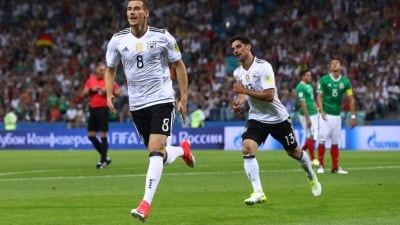One down, one to go. The weekend has already gone rather better than most in German football would have dared imagine and by the end of Sunday evening, the world champions hope to have set down an impressive double marker ahead of next year’s World Cup.
Germany's Under 21s on Friday evening defeated a worldly, experienced Spain in Krakow to lift the title of European champions in that age group and, though the coaching staff across the German Football Federation are resistant to use the word "weakened", the squad that triumphed in the Poland tournament were very obviously missing several players.
Why? They have been busy across the border, in Russia. Seven of the group preparing for Sunday’s Confederation’s Cup final against Chile were eligible for the U21s.
Many of them were promoted to this senior squad because it, too, had excluded some of its best footballers, rested with next summer in mind.
Joachim Low, the manager of Germany, has always preferred the term "perspective team" - not "under-strength", or even "experimental" - for the party he selected for this tournament, very deliberately leaving at home the spine of the side that won the World Cup three summers ago and most of those who would anticipate lining up in Germany’s starting XI through the next 12 months.
It was a bold decision, but the perspective from Saint Petersburg, venue for the final, is pleasingly broad.
The headliners from the last two weeks, in which Germany, unbeaten, have won three of their four matches, scoring 11 goals, with the headlines going to players such as Leon Goretzka, of Schalke.
He is 22, his blitz of two early goals in the semi-final steered Germany to the final and his performances will have some in the abundant stock of more seasoned German attacking midfielders who have been on holiday this past month looking over their shoulders.
Low’s perspective in terms of centre-forwards has improved too, with 21-year-old Timo Werner’s displays in Russia. He and Goretzka are the tournament’s joint leading marksmen, with three goals each.
The last manager to take a German team into a Confeds Cup, Jurgen Klinsmann, has been among those purring at the achievements of Germany’s lesser-known players in Poland and in Russia.
“Put together the 44 players involved in the two tournaments and you’ll see that in total only two of them are over 27 years old,” noted Klinsmann, who, with Low as his deputy, guided Germany to semi-finals at the 2005 Confederations Cup and to third place at the World Cup a year later.
That bodes very well for the long-term. In the medium term, meanwhile, Klinsmann relishes seeing the established stars, such as “Mats Hummels, Jerome Boateng, Thomas Muller, Mesut Ozil, Manuel Neuer, Ilkay Gundogan, Mario Gotze, Toni Kroos, Sami Khedira, Marco Reus and Leroy Sane" – all kept apart from the summer’s missions – respond to the arrival of the newcomers who have grown up as internationals in the course of June.
“Put together, we have well over 50 players who Low will have to pick from for his World Cup squad,“ forecast Klinsmann in the magazine, Kicker.
Low hopes all this youthful effervescence can carry Germany on to the country's first Confederations Cup title, but he is well aware that the South American champions, Chile, have found experience to be as successful an ally in their steady stream of recent titles – a Copa America in 2015, the Copa America Centenario last summer – as youth.
The line-ups in Saint Petersburg present a stark contrast. Chile, who drew 1-1 with Low’s team in the group phase, will line up a quartet of players with over a hundred caps each, while Arturo Vidal, whose vibrant midfield displays have made him a leading candidate for player of the tournament, will play his 91st international, against a Germany made up mostly of footballers who have learnt to look up to Vidal, a Bundesliga champion at Bayern Munich the past two years.
Edu Vargas, and Alexis Sanchez, leaders of Chile’s attack, will note that, for all their attacking enterprise, Germany’s perspective team have yet to keep a clean sheet at the tournament.
Chile have also had a extra day of rest, having played their semi-final – won on penalties against Portugal – a day earlier than Germany.
That will have suited their veterans, giving them a 24-hour head-start on Low’s ambitious young lions.


